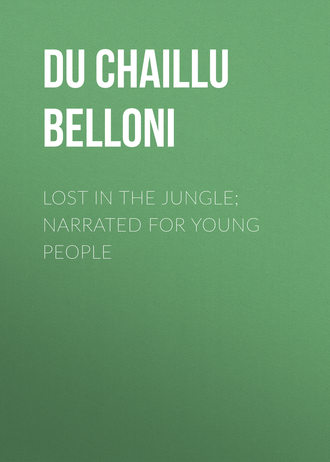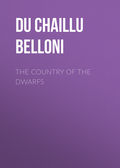
Du Chaillu Paul Belloni
Lost in the Jungle; Narrated for Young People
Silence again succeeded to that great uproar; the wind seemed to whisper through the boughs of the trees; the tranquil river glided down, whose waters were soon to be stained with blood.
In a loud voice the doctor recited the crime of which the three women were accused. Then, pointing to Okandaga, he said that she had, a few weeks before, asked Mpomo for some salt, he being her relative. "Salt was scarce," said he, looking toward the frantic multitude, "and Mpomo refused her; she said unpleasant words to him, for she was angry that he had refused her salt. Then she vowed to bewitch him, and had succeeded, and by sorcery had taken his life."
The people shouted, "Oh, Okandaga, that is the way you do – you kill people because they do not give you what you ask. You shall drink the mboundou! That sweet face of yours is that of a witch. Ah! ah! ah! and we did not know it."
The crime of Quengueza's niece came next to be told. She had been jealous of Mpomo for a long time because he had children and she had none. She envied him; therefore jealousy and envy took possession of her, and she bewitched him.
The people screamed, "How could a woman be so wicked as to kill a man because he had children and she had none! We will give you mboundou to drink, and we will see if you are not a witch."
Quengueza's slave had asked Mpomo for a looking-glass. He had refused her, and therefore she had killed him with sorcery also.
As each accusation was recited the people broke out in curses. Each one rivaled his neighbor in cursing the victims, fearful lest lukewarmness in the ceremony should expose him to a like fate. So Okandaga's father, mother, brother, and sisters joined in the curses. The king's niece was cursed by her brothers and sons, and the poor slave by every body. It was a fearful scene to contemplate.
Then a passage was formed in the vast crowd, and the three women were led to the river, where a large canoe was in waiting. The executioners went in first, then the women, the doctor, and a number of people well armed with huge knives and axes.
By this time the sweat ran down my face. I must have been deadly pale as I followed each motion of these people.
Then the tam-tams beat, and the proper persons prepared the mboundou.
Quabi, Mpomo's eldest brother, who was to inherit all of Mpomo's property, held the poisoned cup. At sight of it poor Okandaga began again to cry, and Quengueza's niece turned pale in the face, for even the negro face at such times attains a pallor which is quite perceptible. Three other canoes, full of armed men, surrounded that in which the victims were.
A mug full of mboundou was then handed to the old slave woman, next to the royal niece, and last to the young and kind Okandaga. As they drank, the multitude shouted, "If they are witches, let the mboundou kill them; if they are innocent, let the mboundou go out!"
It was the most exciting scene in my life. My arrival in the cannibal country was as nothing compared with this. Though horror froze my blood, my eyes were riveted upon the spectacle. I could not help it. Suddenly the slave fell down. She had not touched the boat's bottom before her head was hacked off by a dozen rude swords, the people shouting "Kill her! kill her!" Next came Quengueza's niece. In an instant her head was off, and her blood was dyeing the waters of the river.
During all this time my eyes had been riveted on poor Okandaga. I hoped that she would not fall, but soon she too staggered, and struggled, and cried, vainly resisting the effects of the poison in her system. There was a dead silence – the executioners themselves were still – for Okandaga was the belle of the village, and had more lovers than any body else; but, alas! she finally fell, and in an instant her head was hewn off.
Then all was confusion. In an incredibly short space of time the bodies were cut in pieces and thrown in the river.
I became dizzy; my eyes wandered about; the perspiration fell down from my face in big drops; I could hardly breathe, and I thought I would fall insensible. One scene more like this, and I should have become mad. The image of poor Okandaga was before me, begging me to save her. I retired to my hut, but it felt so hot inside that I could not stay.
When all was over, the crowd dispersed without saying a word; the clamor ceased, and for the rest of the day the village was silent.
In the evening my friend Adouma, uncle of Okandaga, came secretly to my house to tell me how sorry he was that Okandaga had been killed. He said, "Chailly, I was compelled to take part in the dreadful scene. I was obliged to curse Okandaga, but what my mouth said my heart denied. If I had acted otherwise I should have been a dead man before now."
I then spoke to Adouma of the true God, and told him that nothing in the world lasted forever. Men, women, and children died, just as he saw young and old trees die. Often a young tree would die before an old one. Hence young men and young women would frequently die before older ones.
CHAPTER XIX
QUENGUEZA ORDERS ILOGO TO BE CONSULTED ABOUT HIS ILLNESS. – WHAT THE PEOPLE THINK OF ILOGO. – A NOCTURNAL SÉANCE. – SONG TO ILOGO. – A FEMALE MEDIUM. – WHAT ILOGO SAID.
What a strange village Goumbi is! It is well that I am the friend of King Quengueza. The people are so superstitious. We had hardly got over the affair of witchcraft when the people declared they must find some means of ascertaining the cause of the king's sufferings. Quengueza had sent word himself that his people must try to find out from Ilogo why he was sick, and what he must do for his recovery.
Ilogo is believed by the people to be a spirit living in the moon – a mighty spirit, who looks down upon the inhabitants of the earth – a spirit to whom the black man can talk. "Yes," they said, "Ilogo's face can be seen; look at it." Then they pointed out to me the spots on the moon which we can see with our naked eye. These spots were the indistinct features of the spirit.
One fine evening, at full moon (for, to consult Ilogo, the moon must be full, or nearly so), the women of the village assembled in front of the king's house. Clustered close together, and seated on the ground, with their faces turned toward the moon, they sang songs. They were surrounded by the men of the village. I shall not soon forget that wild scene. The sky was clear and beautiful; the moon shone in its brightness, eclipsing by its light that of the stars, except those of the first magnitude; the air was calm and serene, and the shadows of the tall trees upon the earth appeared like queer phantoms.
The songs of the women were to and in praise of Ilogo, the spirit that lived in ogouayli (the moon). Presently a woman seated herself in the centre of the circle of singers and began a solo, gazing steadfastly at the moon, the people every now and then singing in chorus with her. She was to be inspired by the spirit Ilogo to utter prophecies.
At last she gave up singing, for she could not get into a trance. Then another woman took her place, in the midst of the most vociferous singing that could be done by human lips. After a while the second woman gave place to a third – a little woman, wiry and nervous. She seated herself like the others, and looked steadily at the moon, crying out that she could see Ilogo, and then the singing redoubled in fury. The excitement of the people had at that time become very great; the drums beat furiously, the drummers using all their strength, until covered with perspiration; the outsiders shouted madly, and seemed to be almost out of their senses, for their faces were wrinkled in nervous excitement, their eyes perfectly wild, and the contortions they made with their bodies indescribable.
The excitement was now intense, and the noise horrible. The songs to Ilogo were not for a moment discontinued, but the pitch of their voices was so great and so hoarse that the words at last seemed to come with difficulty. The medium, the women, and the men all sang with one accord:
"Ilogo, we ask thee,
Tell who has bewitched the king!
Ilogo, we ask thee,
What shall we do to cure the king?
The forests are thine, Ilogo!
The rivers are thine, Ilogo!
The moon is thine!
O moon! O moon! O moon!
Thou art the home of Ilogo!
Shall the king die? O Ilogo!
O Ilogo! O moon! O moon!"
These words were repeated over and over, the people getting more terribly excited as they went on. The woman who was the medium, and who had been singing violently, looked toward the moon, and began to tremble. Her nerves twitched, her face was contorted, her muscles swelled, and at last her limbs straightened out. At this time the wildest of all wild excitement possessed the people. I myself looked on with intense curiosity. She fell on her back on the ground, insensible, her face turned up to the moon. She looked as if she had died in a fit.
The song to Ilogo continued with more noise than ever; but at last comparative quiet followed, compelled, I believe, by sheer exhaustion from excitement. But the people were all gazing intently on the woman's face.
I shall not forget that scene by moonlight, nor the corpse-like face of that woman, so still and calm. How wild it all looked! The woman, who lay apparently dead before the savages, was expected at this time to see things in the world of Ilogo – that is to say, the moon – to see the great spirit Ilogo himself; and, as she lay insensible, she was supposed to be holding intercourse with him. Then, after she had conversed with the great spirit Ilogo, she would awake, and tell the people all she saw and all that Ilogo had said to her.
For my part, I thought she really was dead. I approached her, and touched her pulse. It was weak, but there was life. After about half an hour of insensibility she came to her senses, but she was much prostrated. She seated herself without rising, looking round as if stupefied. She remained quite silent for a while, and then began to speak.
"I have seen Ilogo, I have spoken to Ilogo. Ilogo has told me that Quengueza, our king, shall not die; that Quengueza is going to live a long time; that Quengueza was not bewitched, and that a remedy prepared from such a plant (I forget the name) would cure him. Then," she added, "I went to sleep, and when I awoke Ilogo was gone, and now I find myself in the midst of you."
The people then quietly separated, as by that time it was late, and all retired to their huts, I myself going to mine, thinking of the wild scene I had just witnessed, and feeling that, the longer I remained in that strange country, the more strange the customs of the people appeared to me. Soon all became silent, and nothing but the barking of the watchful little native dogs broke the stillness of the night. The moon continued to shine over that village, the inhabitants of which had run so wild with superstition.
CHAPTER XX
DEPARTURE FROM GOUMBI. – QUERLAOUEN'S VILLAGE. – FIND IT DESERTED. – QUERLAOUEN DEAD. – HE HAS BEEN KILLED BY AN ELEPHANT. – ARRIVE AT OBINDJI'S TOWN. – MEETING WITH QUERLAOUEN'S WIDOW. – NEITHER MALAOUEN NOR GAMBO AT HOME.
After a few days thus spent in Goumbi, we had to get ready to be off.
Adouma made the preparations for our journey; canoes were lying on the banks of the river, waiting to carry the people Quengueza had ordered to go with me. These were, for the most part, the king's slaves. Plantains and cassava had been gathered for our journey. We were to ascend the river as far as Obindji.
One fine morning we started, several very large canoes being filled with men who were to escort me.
Adouma was in my canoe, holding a large paddle as a rudder. We were in a canoe which was chiefly loaded with my outfit and presents.
We left Goumbi silently, for the death of Mpomo made singing out of order. The people were in mourning.
Some of the men who were to accompany me had most curious names, such as Gooloo-Gani, Biembia, Agambie-Mo, Jombai, Monda, Akondogo.
The day became exceedingly hot and sultry, and toward evening we were overtaken by a terrible storm of wind and rain – a real tornado burst upon us.
The next morning we were on our way for the upper river.
I was glad I was about to see my old friend Querlaouen once more. I was also to see my other friends, Malaouen and Gambo.
I had nice presents for Querlaouen, and pretty beads for his wife and children. Among the presents for Querlaouen was a handsome gun and a keg of powder for shooting elephants, leopards, gorilla, and all sorts of wild game.
As we ascended the river I recognized the point on the other side of which was Querlaouen's plantation. I ordered the men to sing, in order that Querlaouen might thus hear of our arrival. The nearer we came to the point the louder became the beatings of my heart. To see old Querlaouen, with whom I had had so many pleasant days; who had bravely shared all kinds of danger with me, including hunger and starvation; with whom I had slain gorilla – I was in a hurry to give to him and his wife their presents. To see such a friend was indeed to have a great treat.
Our canoes soon passed the point. I was looking eagerly, watching for somebody on the river bank. No one! Perhaps our songs had not pierced through the woods. The wind was coming from an opposite direction.
"Sing louder," I exclaimed, for I fancied they did not sing loud enough. They looked at me as if they would have said, "What's the matter with Chally, he looks so excited?" Little did they know my feelings, and how my heart beat for Querlaouen.
They sang louder, till I could hear the echo of their voices among the hills that surrounded us. I looked, but no one was on the shore. Querlaouen might have gone hunting, but surely his wife, or brother, or some of his children must be there. All was silent.
I shouted with all my power, "Querlaouen, your friend Chally has come! your friend Chally has come!" but the hills sent back the echo of my voice to me. I fired a gun, and the echo resounded from hill to hill, and no one came. I began to feel oppressed. A presentiment flashed over my mind. Was Querlaouen dead?
At last I landed on the very shore where Querlaouen lived. Again I shouted, "Querlaouen, where are you?" I called his wife. The silence of death was there.
I advanced, but lo! when I reached the village, it was deserted. Not a soul was seen. The jungle was the thickest where his little clearing had been. The houses had tumbled down. Desolation was before me. The grass had grown to a man's height in the little street.
What a pang of sorrow shot through my heart! I could not help it. I shouted, "Querlaouen! my friend Querlaouen, what has become of you? You are not dead, are you?" and I looked with profound sadness on the scene around. Days that had passed came to my memory.
I retraced my steps, disappointed, and with a foreboding heart. On the river bank, just as I was on the point of stepping into the canoe, a Bakalai came out from the jungle. He had recognized me, and came to meet me.
As soon as I saw him, I cried out, "Where is friend Querlaouen?" His answer seemed so long in coming – "Dead!"
"Dead!" I exclaimed; "Querlaouen dead!" and, I could not help it, two tears rolled down my cheeks.
"Querlaouen dead!" I repeated again. The recollection of that good and noble savage flashed upon me as fast as thought can flash, and once more and in a low voice I said, "Dead! Querlaouen dead!"
When I became composed again, I asked, "How did he die?"
"One day," said the Bakalai man, "a few moons ago – it was in the dry season – Querlaouen took his gun and a slave along with him, and went out into the woods to hunt after an elephant which had the day before destroyed a whole plantation of plantain-trees, and had trampled down almost a whole patch of sugar-cane. His slave, who accompanied him, but had left him for a few minutes to look at one of the plantations close by, heard the report of Querlaouen's gun. He waited for his return, but Querlaouen did not come back. He waited so long that he began to feel anxious, and at last set out to seek him. He found him in the forest dead, and trampled into a shapeless mass by the beast, which he had wounded mortally, but which had strength enough to rush at and kill its enemy. Not far from Querlaouen lay the elephant, dead."
How poor Querlaouen, who was so prudent a hunter, could have been caught by the elephant, I could not learn.
The man said it was an aniemba (witchcraft) that had killed Querlaouen; that Querlaouen's brother had bewitched him, and caused, by witchcraft, the elephant to trample upon him.
The brother was killed by the mboundou which the people made him drink; for they said his brother made him go hunt that day, when he knew the elephant would kill him.
That family, who really loved each other, and lived in peace and unity, was then divided asunder. The brother being killed, the women and children had gone to live with those to whom they belonged by the law of inheritance, and were thus scattered in several villages.
With a heavy heart I entered my canoe, but not before giving a bunch of beads to the Bakalai who had told me the story of the untimely death of poor Querlaouen.
We ascended the river silently, I thinking of the frailty of human life, and that perhaps a day might come when some elephant would trample upon me, or some ferocious leopard carry me away in his jaws, or some gorilla would, with one blow of his powerful hand, cut my body in two. Perhaps fever might kill me. I might encounter an unfriendly tribe and be murdered.
I raised a silent prayer to the Great Ruler of the universe to protect me, and said, "God, thou knowest that I am guided only by the love of discovering the wonders of thy creation, so that I may tell to my fellow-creatures all that I have seen. I am but a worm; there is no strength in me. What am I in this great forest?" Oh how helpless I felt. The news of Querlaouen's death had very much depressed my spirits, casting a heavy gloom over me.
To this day I love to think of friend Querlaouen, of his family, and of his children, and of the great hunts we have had together.
We finally approached Obindji's town, and soon were landed on the shore, where his little village was built with the bark of trees.
I need not say what a welcome we received. But lo! what do I see? Querlaouen's wife! She had come here on a visit. As is customary in that country for friends who have not seen each other for a long time, we embraced.
The good woman was so glad to see me. She still wore the marks of her widowhood. Her hair was shorn, she wore no ornament whatever, and did not even wash.
She spent the evening with me, telling me all her troubles, and that, as soon as her season of widowhood was finished, she was to become the wife of Querlaouen's youngest brother. "But," added she, "I will never love any one as I loved Querlaouen." She was to live in the mountains of the Ashankolo.
This was probably the last time I was to see the wife of my good friend Querlaouen, the Bakalai hunter, and all the friendship I ever had for her husband was now hers; so I went quietly to one of my chests, and, taking a necklace of large beads, fixed it round her neck; then put my hand on the top of her head, and gave her a bongo (a law), which was, that she must never part with these beads, and that, as years would roll by, she must say, "These beads came from Chally, Querlaouen's friend."
The old woman was so much touched that she trembled, and tears stood in her eyes.
After keeping the necklace for two or three minutes round her neck, she took it off, for a woman in mourning can not wear any ornaments. She said she would keep the beads till she died, and then they should be buried with her. I gave her some other presents, which she hid, "for," said she, "if the people knew I had such nice things, they might bewitch me in order to obtain them. Chally, the country is full of aniemba." These last words she uttered in a very low voice.
Obindji told me that he had heard Malaouen had gone on some trading expedition. I had, therefore, only to regret not being able to see him or Gambo, who had returned to his own country.
I missed them dreadfully, and I left word with Obindji to tell them to come to the Ashira country after me.
I could not possibly remain, and all the entreaties of friend Obindji could not make me stay. I must go to the Ashira country.
In the mean time, a new comer is to be one of the chiefs of the party. Okendjo, an Ashira man, with Adouma, is going to lead us. Adouma received very positive orders from the king to follow me to the Ashira country. Wherever I go, he must not return without me.
With Bakalai and Goumbi people, amounting to thirty-two men all told, I left the morning after my arrival for the Ashira land.
Okendjo was in his glory; he had conceived the brilliant idea of taking the first moguizi into his country.





